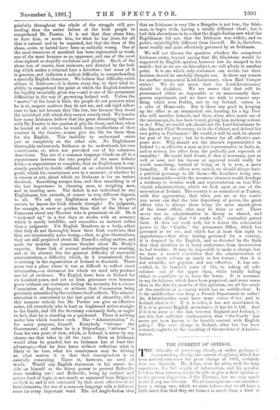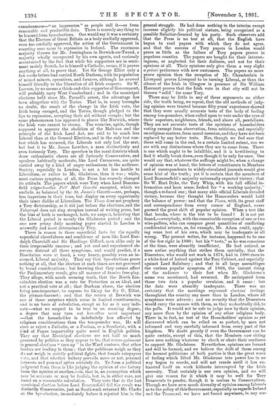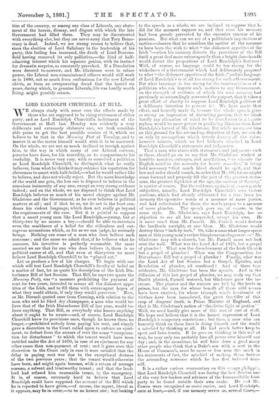THE CURRENT OF OPINION.
THE difficulty of perceiving clearly, or rather perhaps of
demonstrating clearly, the current of opinion, which has been noticed ever since the great change of 1867, certainly does not diminish. Mr. Adam, were he alive, with his long experience, his full supply of information, and his peculiar freedom from rancour, might be able to give a final opinion as to the present disposition of the Electors, but we very much doubt if any one else can. We all have opinions—we ourselves have a strong one, which we state below—but we all have a little inner fear that they are formed as much from a kind of consciousness—" an impression" as people call it—as from reasonable and producible data. There is scarcely anything to be learned from bye-elections. One would say it was a certainty that the Electors of Great Britain as a body cordially approved, even too cordially approved, the action of the Government in resorting once more to repression in Ireland. The enormous majority thrown for Mr. Jerningham in Berwick-on-Tweed, a majority wholly unexpected by his own agents, and curiously accentuated by the fact that while his supporters are in senti- ment mainly Scotch, he is himself a Catholic, seems, if it proves anything at all, to prove that. Yet Sir George Elliot only a few weeks before had carried North Durham, with its population of mixed miners, operatives, and farmers, although he avowed himself friendly to the liberation of all Irish suspects. Sir W. Lawson, by no means a thick-and-thin supporter of Government, will probably carry West Cumberland ; and in the municipal elections held since Mr. Parnell's arrest, the advantage has been altogether with the Tories. That is, in many boroughs no doubt, the result of the change in the Irish vote, the Irish being enraged, and the Tories, though pledged to the lips to repression, accepting their aid without scruple ; but the same phenomenon has appeared in places like Norwich, where the Irish vote cannot be strong. The counties, again, though supposed to approve the abolition of the Malt-tax and the principle of the Irish Land Act, are said to be much less Liberal than at the General Election, and in the only test con- test which has occurred, the Liberals not only lost the seat, but lost it to Mr. James Lowther, a man distinctively and even furiously Tory. The speeches in the rural districts which draw enthusiastic cheers are all furiously Conservative, and speakers habitually moderate, like Lord Carnarvon, are quite carried away by a kind of angry enthusiasm in the audience. Society, especially in London, is not a bit less hostile to Liberalism, or rather to Mr. Gladstone, than it was ; while, most curious symptom of all, the Press has scarcely changed its attitude. The papers which were Tory when Lord Beacons- field reigned—the Pall Mall Gazette excepted, which we exclude, as balanced by the St. Tames's Gazette—are, perhaps, less imperious in their tone, but display on every opportunity their inner dislike of Liberalism. The Times does not prophesy a Tory dictatorship, as it did just before the elections, and the Telegraph does not sing strophes instead of writing prose, but the bias of both is unchanged, both, we suspect, believing that the Liberal period is merely the Gladstone period ; and the one new penny daily morning paper started in London is avowedly and most determinately Tory. There is reason in these superficial facts for the equally superficial cheerfulness and confidence of men like Lord Ran- dolph Churchill and Sir Hardinge Giffard, men alike only in their irrepressible rancour ; and yet cool and experienced ob- servers distrust all these symptoms, and would predict, if a Dissolution were at hand, a very heavy, possibly even an in- creased, Liberal majority. They say that bye-elections prove nothing at all, that the electors at such times are not governed by broad considerations ; but knowing that they cannot affect the Parliamentary result, give all manner of fancies free-play. They allege, with much seeming truth, that the North Lin- colnshire election was a vote for Protection as an ideal, and not a practical vote at all ; that Durham chose, the election being non-important, to express its liking for Sir G. Elliot, the pitman-baronet ; and that the return at Berwick was one of those surprises which occur in limited constituencies, and is no basis of calculation, except so far as it may indi- cate—what we suspect to be true to an amazing degree, a degree that may turn out hereafter most important —that the householder is indefinitely less affected by religious considerations than the ten-pounder was. He will elect or reject a Catholic, or a Puritan, or a Secularist, with a kind of Pagan impartiality quite novel in English politics.
They say that Municipal elections are not half so much governed by politics as they appear to be, that voters quiescent in general elections " turn up " in the Ward contests, that other leaders are leading in them ; that the publicans weigh as they d) not, weigh in strictly political fights, that female ratepayers vote, and that whether bribery prevails more or not, personal interests and personal spites certainly do. To form a political judgment from them is like judging the opinion of one factory from the opinion 'of another,—is, that is, an assumption which may be accurate or may be foolish, but is, in either case, not based on a -reasonable calculation. They note that in the last municipal election before Lord Beaconsfield fell the result was distinctly Conservative, just as Southwark returned Mr. Clarke at the bye-election, immediately before it rejected him in the general struggle. He had done nothing in the interim except increase slightly his political stature, being recognised as a possible Solicitor-General by his party. Such observers add that the Press is no test at all, that the English have begun to read papers with which they do not agree, and that the success of Tory papers in London would prove as little as the failure of Tory papers proves in populous counties. The papers are bought for their interest-.
ingness, or neglected for their dullness, and not for their opinions at all. Their opinions only give them a very slight a priori preference with new customers. The papers no more prove opinion than the reception of Mr. Chamberlain in Liverpool proves Liverpool to be turning Liberal, or than the silence of the Irish in Glasgow in presence of Sir William Harcourt proves that the Irish vote in that city will not be thrown " solid " for some Tory.
There may be little in any of these arguments on either side, the truth being, we repeat, that the old methods of judg- ing opinion were trusted because fifty years' experience showed that they were usually accurate tests of the body of feeling among ten-pounders, when called upon to vote under the eyes of their superiors, neighbours, friends, and above all, pewfellows. They are not accurate tests of the opinions of householders voting exempt from observation, from criticism, and especially on religious matters, from moral coercion, and they have not been replaced by any better tests. Nor, though we feel sure that these will come in the end, to a certain limited extent, can we see with any distinctness where they are to come from. There is one which ought to be infallible, and it is bewildering to find it wholly break down, even though it be only for once. One would say that, whatever the suffrage might be, when a change of opinion was at hand, the letters of constituents to Members and of correspondents to widely-circulated journals would give some hint of the truth ; yet it is certain that the members of Lord Beaconsfield's majority universally expected victory; that Sir W. Hart Dyke, the Tory Whip, with his full official in- formation and keen sense, looked for 'a working majority," though a reduced one ; that many able official Liberals dreaded victory, because they thought the Home-rulers would hold the balance of power; and that the Times, with its great staff and correspondence from every corner of England, never guessed the great shift of popular opinion. When a test like that breaks, where is the test to be found ? It is not yet found,—everybody, with the conceivable exception of one or two wire-pullers, who can compare great quantities of conflicting confidential returns, as, for example, Mr. Adam could, apply- ing some test of his own, which may be inadequate or all wrong. The present writer, for instance, happened to be one of the few right in 1880; but his "tests," as he was conscious at the time, were absurdly insufficient. He had noticed, as men notice anything that strikes them specially, that the Dissenters, who would not work in 1874, had in 1880 risen to a white-heat of hatred against the Tory Cabinet, and especially against Lord Salisbury ; and that, in all large assemblages the curious popular symptom of 1868, the instant rising of the audience to their feet when Mr. Gladstone's name was mentioned, had recurred. He anticipated from those two data a popular revulsion, and it came ; but the data were absurdly inadequate. There was no certainty that the meetings expressed electors' feelings throughout the country any more than in London, where all symptoms were adverse ; and no security that the Dissenters would carry the masses with them, as they undoubtedly did, to the polls. It would not be safe to judge now by their opinion, any more than by the opinion of any other religious body.
There is, in fact, no test of the Householders' opinion as yet discovered which can be relied on as perfect, by men not informed and very carefully informed from every part of the kingdom. We doubt greatly if even the Government can be quite certain, except of this, that the Members now sitting have seen nothing whatever to check or abate their readiness to support. Mr. Gladstone. Nevertheless, opinions are formed and will be formed, and we believe the drift of them among the keenest politicians of both parties is that the great wave of feeling which lifted Mr. Gladstone into power has in no way begun to recede, and will not recede until it has ex- hausted itself on work hitherto interrupted by the Irish necessity. That certainly is our own opinion, and we will give one reason for it which it may be well for Tory Democrats to ponder, -though it is useless to 'Conservatives. Though we have seen much diversity of opinion among Liberals asio the policy of this Governmentospecially as regards Ireland and the Transvaal, we have not 'found anywhere,in any sec- tion of the country, or among any class of Liberals, any abate- ment of the horror, dismay, and disgust with which the late Government had filled them. They may be discontented with everything else, but they are never sorry that Tory Demo- cracy is dead. Indeed, we see strong reason to believe that, since the election of Lord Salisbury to the leadership of his party, this feeling has increased, the death of Lord Beacons- field having removed its only palliative,—the kind of half- admiring interest which his separate genius, with its instinct for dramatic surprise, so constantly provoked. If a Dissolution were decreed to-morrow, and Mr. Gladstone were to refuse power, the Liberal non-commissioned officers would still work as in 1880, not so much from enthusiasm for the new Liberal chiefs, as from an overpowering dread that the horrid six years, during which, to genuine Liberals, life was hardly worth living, might possibly return.




































 Previous page
Previous page